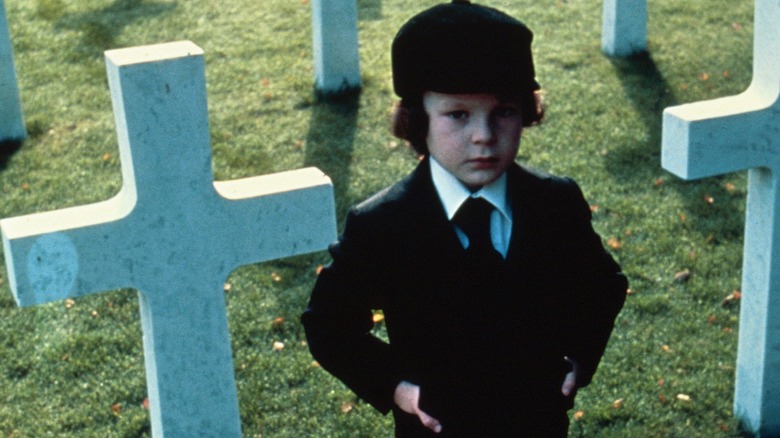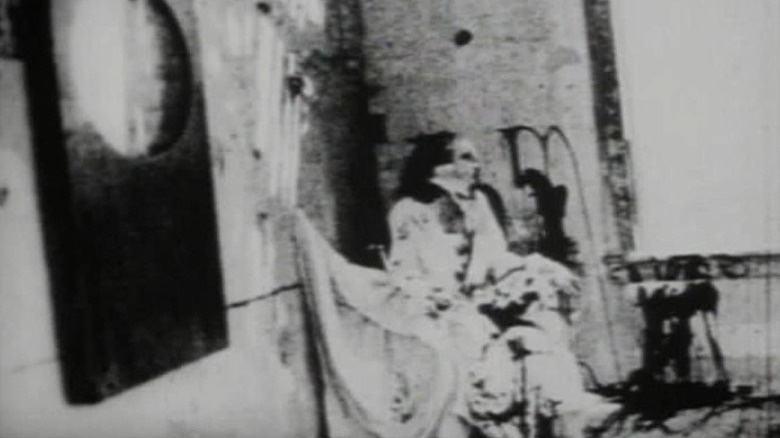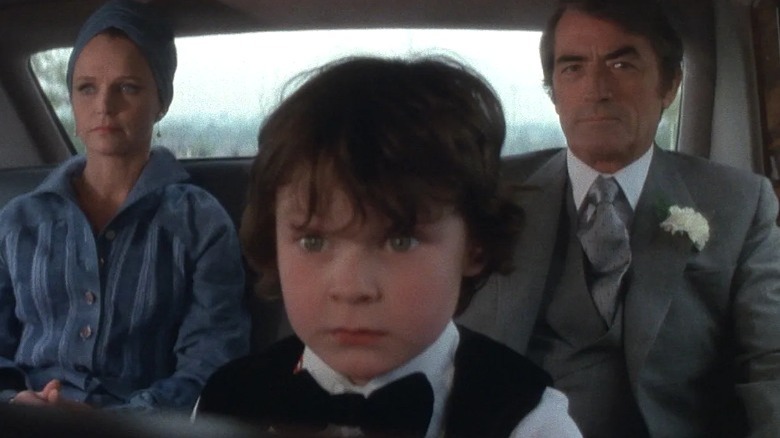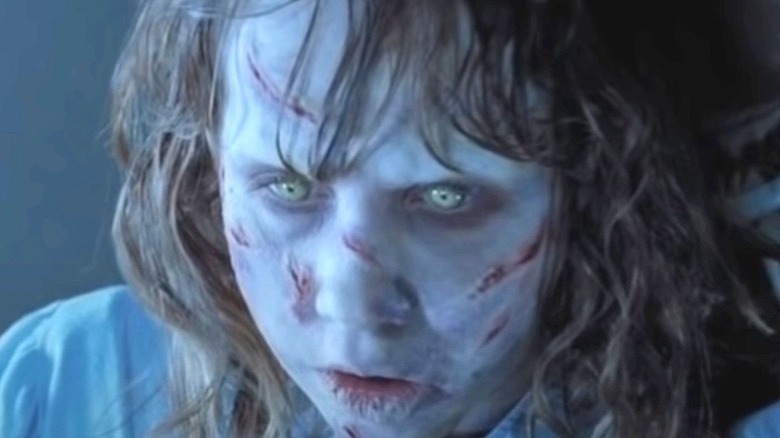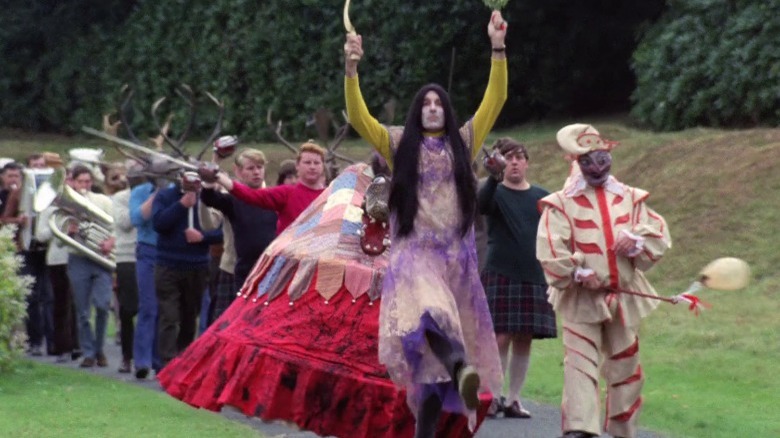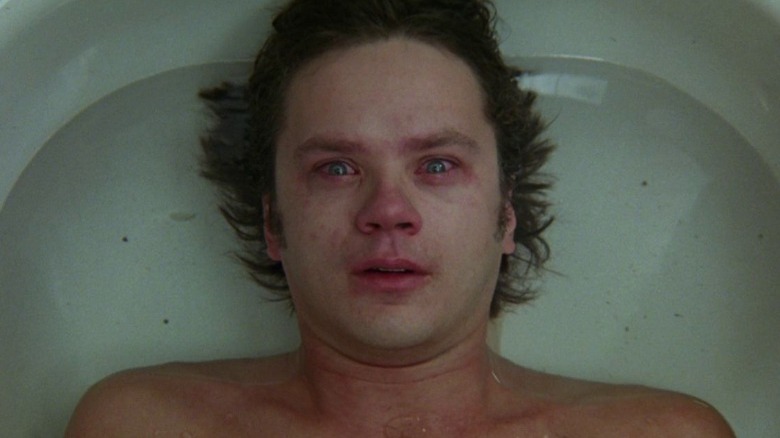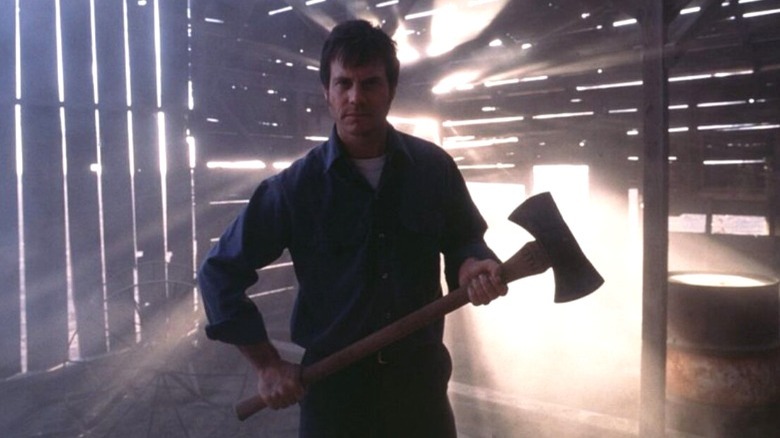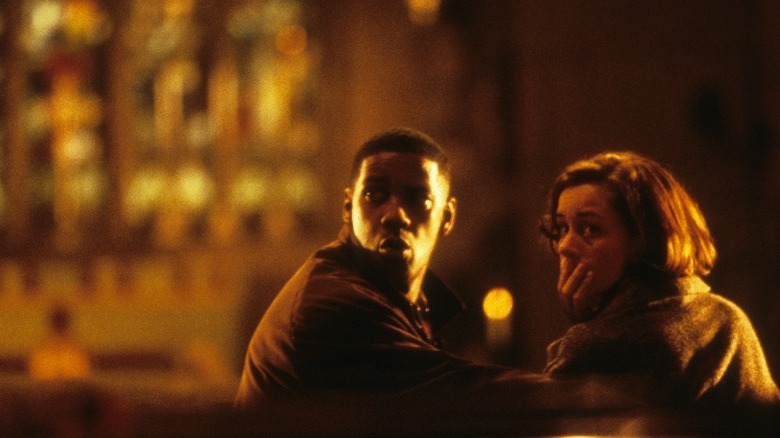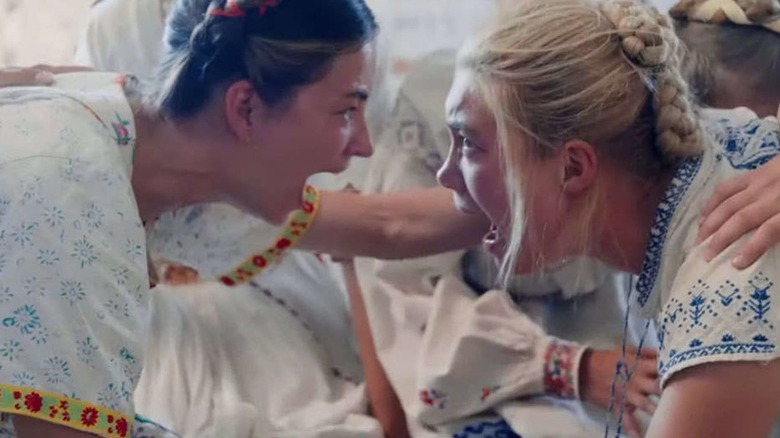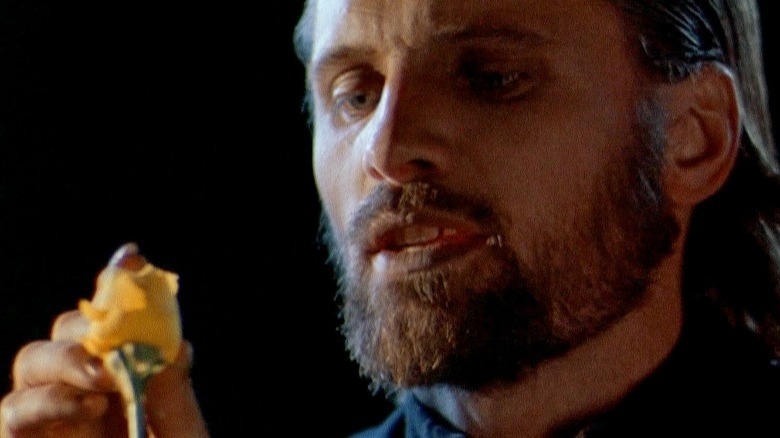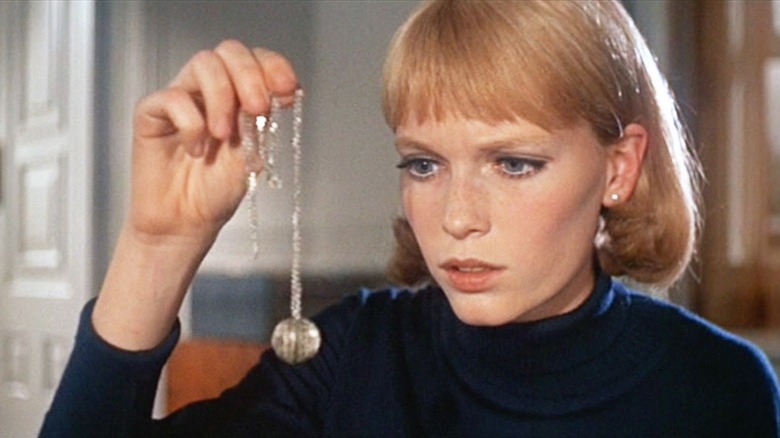The 10 Best Religious Horror Movies You Need To Check Out
Religious horror is more than an exploration of the stranger corners of Catholic theology. Folk horror, with its old-world pagan trappings, has a place in the genre, and the occasional Gnostic lore sneaks into the corners as well, but Christian-themed horror prevails on American turf, built from all the familiar icons the country's Puritan ancestors railed against. Intricate rituals that feel like sacred magic gone wrong. Demons lurk around every corner, waiting to claim your soul.
Creature scares and the Roman ritual of exorcism aside, religious horror (when it works) is a comfort food against the too-real evils of the world. All the bad things that happen to us are not our fault. They're tests, trials, or even just the cruel machinations of the Devil Itself. For those of us with no personal connection to theologies, these films can be a roaring good time through a world we rarely deal with. If the movie's done its job right, it'll leave us with some questions that may or may not fade by morning. These are 10 of the best religious horror movies you need to check out, the ones with some of the best scares, best devils, and — in one particular case — the best musical numbers of all time.
Begotten (1989)
With all respect to the cast's hard work, Darren Aronofsky's "mother!" made a mess out of its biblical symbolism, and his core theme of patriarchy fueled by the rightness of God versus the Earth is lost when you're too busy with more questions than the film will answer. It was also done better in 1990, in E. Elias Merhige's "Begotten." With feverish surrealism and nightmarish visuals, this black and white silent film opens with God disemboweling himself — shades of Lars von Trier's "Antichrist" — and ends with the murder and dismemberment of Mother Earth and her son.
It's a bleak but thoughtful ride around the symbols of faith. The central plot beats fit with a dreadful retelling of Genesis from creation to expulsion, ending roughly with the flood depicted as the murder and rebirth of the Earth ... maybe, your call. With Druidic and Gnostic elements helping to weave this nightmare together with the rope of a modern take on German Expressionism, one interpretation is evident by the end: The very act of creation is its own kind of horror, one that reality can never escape.
The Omen (1976)
There are two GOATs of religious horror, and 1976's "The Omen" is one of them. Directed by Richard Donner — yeah, the guy that made the best "Superman" movie two years later — and starring Hollywood legend Gregory Peck, this is the movie that made everyone look askance at that one weird kid everyone knew for decades and killed the popularity of the name Damien for pretty much ever. It's also the basis for the sweet kid anti-antichrist in Neil Gaiman's "Good Omens." And probably "Hellboy," come to think of it.
Damien doesn't have a hope in Hell of overcoming his destiny as the son of Satan. He's the product of a seemingly innocent baby swap when a diplomat and his wife lose their baby in childbirth. He's raised with all the privileges of his extended family, including a short series of unsettling nannies and the unconscious ability to protect his existence. The deaths are few compared to the modern slasher, but they are creative as all hell, with veteran actor David Warner earning the best defenestration in cinema. A little slow-paced these days, it's a film that still holds up. There is a 2006 remake. Don't. Go straight to the OG.
The Exorcist (1973)
An unmissable genre classic, 1973's "The Exorcist" is a masterclass of tension, implication, and special effects. Avoid the "Version You've Never Seen" for your first viewing, though. The handful of added scenes spoils the tone and pace, with the one new effects sequence — while cool — blowing up the terrifying claustrophobia of Regan's (Linda Blair) full-blown possession. This version is a curiosity for obsessed fans to ponder as well as a reminder that the director's cuts aren't always big wins for the audience.
The original cut remains simply spectacular. The crisis of faith Father Karras (Jason Miller) is going through is paced perfectly against the rising trial he's about to face. Father Merrin (Max von Sydow) adds so much comforting gravitas that, when he falters, it's scarier than the things the demon is doing to this poor kid. "The Exorcist" also does somewhat right by the modern Roman Ritual, emphasizing the efforts to help Regan via modern science first, addressing her mental health next, and only finally resorting to the tools of faith to expel Father Merrin's old nemesis.
The Wicker Man (1993)
"The Wicker Man" is the ur-example of folk horror, where the modern meets the mythic. This 1973 cult classic pits its ancient rites and nameless paganism against a man of faith, who feels a little archaic in his own right. Edward Woodward plays the good copper Neil Howie, a man intent on figuring out the mystery of missing lass Rowan Morrison. The island of Summerisle is only too glad to welcome him, and its Lord Summerisle — played by none other than Sir Christopher Lee — is quick to make him feel like their guest of honor ... rather literally, it turns out.
Sergeant Howie's firm Christian faith is tested throughout this film, with a world of ungodly physical and spiritual delights dangled before him, but he's confident in his beliefs as his shield, a confidence that ultimately has tragic results. Had he wavered at all, "The Wicker Man" would have had a very different ending. As it is, it's hard to tell which side wins in the end. It's a beautiful, eerie ride through rural lands and old faiths, as well as the movie Christopher Lee called his best work. There's nothing else quite like this film, and it continues to inspire folk horror today.
Jacob's Ladder (1990)
"Jacob's Ladder" is secular enough in tone for anybody to love. Its theme is still built on Christian parables/theological symbolism, and knowing a little about the Old Testament helps draw even more from this story about being haunted. It's not a house that's haunted, specifically, but the man himself. Jacob Singer (Tim Robbins) is a Vietnam war veteran whose life begins turning inside out as vivid hallucinations cause him to question his reality.
The question of what is real in the film actually makes room for plenty of debate after its closes, but the story efficiently sets up multiple interpretations of Singer's ghastly visions. It also discusses the biblical idea of Jacob's Ladder itself, the 'lone route' to salvation, or a moment of transfiguration. That's a key tool for any of those final interpretations, but what may make this subtle religious horror even more compelling for modern audiences are its connections to the multimedia horror franchise "Silent Hill": poor, tormented Jacob Singer inspired Akihiro Imamura's bleak town and twitchy monsters.
Frailty (2001)
Did God actually tell this rural father (Bill Paxton) to find and slay the demons walking among humankind? That's the question "Frailty" wants you to ask yourself. Much of the film lets you question if the Meiks family son airing out the family secrets (Matthew McConaughey) is just a victim of a deadly upbringing. Less viable but still worth asking is if the Devil itself is playing the longest game of all.
The film has a clear answer by the end, and it's some chilling, Old Testament stuff that gets uglier the more you think about it. Taut and doing plenty on a cheap budget, Paxton's 2001 directorial debut previewed the McConnaisance a decade early. The best scenes aren't the dad's demonic kill count, although they are a treat, with a holy axe and the will to use it. It's McConaughey vs. Powers Boothe, as the FBI agent investigating the God's Hand murders. The two play off of each other with upfront charm and distrust. By the end of it, the Meiks may not inherit the Earth, but they're dead set on protecting it. For better or for worse.
Fallen (1998)
You'll never listen to the 1964 Rolling Stones chart-topper "Time is On My Side" the same way again after watching "Fallen." Denzel Washington plays Detective Hobbes, whose very name is a philosophy gag about absolutist authority in the service of society. Hobbes, as a cop, tries to use that authority as a shield here. It doesn't work out for the detective, who thinks the worst is over when the infamous serial killer that he caught, Edgar Reese (Elias Koteas), is up for the electric chair.
At first, Hobbes thinks a copycat has sprung up in the wake of Reese's execution. Eventually, he turns to demonology where a fictionalized variant of Azazel turns out to be the real blame for decades of murders. While the theology is fuzzy since Azazel was originally part of the old Mishnaic version of the holy Jewish holiday of Yom Kippur as part of a scapegoat ritual, the results are spooky and spectacular. It's modern noir by way of "The Exorcist," and like its ancestor the finale is less than completely comforting. Azazel itself is one of the best-unseen antagonists in horror history, its true form never even hinted at, but it uses its abilities to body-hop to expert effect. At one point it even dances around Hobbes in a busy crowd, unsettling him with a fleshy version of a shell game.
Midsommar (2019)
Ari Aster offers one of the best modern folk horror riffs in "Midsommar," a film so satirically and bleakly pagan under all of its pastoral beauty that Christopher Lee's Lord Summerisle would probably have loved it. Christianity doesn't get much airtime in this film. Instead, underneath the breaking relationships and disrespect for local culture is a story about just how damn easy it is to fall for a cult. The audience, enthralled by its sympathy for Dani (Florence Pugh), is likely to miss its deliberately crafted Make Odinism Great Again undertones at first glance. Folks, if your local Asatru group isn't welcoming multicultural society, find a new one.
Even without that horrifying realization, "Midsommar" is a peak breakup movie, a riot of emotion and color that lets Dani feel everything she needs after the loss of her family ... just maybe not in the healthiest of ways. She's on the cusp of finding safety among a new family after a series of horrifying deaths and questionable rituals, but so did Squeaky Fromme. A follow-up to "Midsommar" someday would be a hell of a trip. Would Dani be the one to lure in fresh blood? Or would she finally ask herself some big questions about her new friends?
The Prophecy (1995)
When "The Lord of the Rings: The Fellowship of the Ring" came out, there were two kinds of people that recognized Viggo Mortensen as Aragorn, son of Arathorn. They first knew him from "G.I. Jane," a generic military drama, but the rest of us knew him as one of the best cult movie depictions of Lucifer to date, licking up the scenery in the underrated horror cheapie "The Prophecy." Want to know how we knew Viggo was going to be something special someday? He actually upstages Christopher Walken as the Archangel Gabriel.
No mean feat when Gabriel is one of the wildest, meatiest depictions of a rogue angel anyone could want. Gabriel can't stand God playing favorites with humanity, so he's down on Earth trying to gin up a new war in Heaven just to mix things up. He even brings the trumpet he's meant to herald the biblical apocalypse along and lets kids play with it. The almost slapstick melodramas between Lucifer, Gabriel, and another angel named Simon (Eric Stoltz) overshadow what the humans are doing to try and avert this new holy war. That's okay since the angelic host is having way too much fun to make us feel bad about the rest of the film's flaws.
Rosemary's Baby (1968)
One of the hallmarks of a great movie is an agelessness that lets future generations enjoy its story, despite any big changes in historical context. "Rosemary's Baby" has aged hard in places with its awkward maternity medicine and bucolic New York streets, but since the repeal of Roe vs. Wade, the very concept of a woman who has control of her body stripped from her by a bunch of religious busybodies and gaslighting men is, as it ever was, way too real for comfort.
Rosemary (Mia Farrow) is fragile in stature, but she's far from stupid. An almost ethereal presence, Rosemary's trying to be her best around her strange neighbors in their swank new apartment building. Her husband is consumed with trying to get better acting gigs, leaving her feeling more alone than ever. On the bright side, she's set for babysitters once her newborn arrives. Unfortunately, that's exactly what the leering old couple who keeps getting into her business was hoping for. Secular, satirical, and harrowing, this classic plays the Antichrist story like a straight-man gag, with some dark laughs to lighten up the atmosphere.
